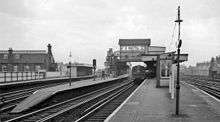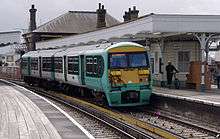Battersea Park railway station
| Battersea Park | |
|---|---|
 | |
 Battersea Park Location of Battersea Park in Greater London | |
| Location | Battersea |
| Local authority | London Borough of Wandsworth |
| Managed by | Southern |
| Station code | BAK |
| DfT category | D |
| Number of platforms | 5 (4 in use) |
| Fare zone | 2 |
| National Rail annual entry and exit | |
| 2004–05 |
|
| 2005–06 |
|
| 2006–07 |
|
| 2007–08 |
|
| 2008–09 |
|
| 2009–10 |
|
| 2010–11 |
|
| 2011–12 |
|
| — interchange | 95,771[1] |
| 2012–13 |
|
| — interchange |
|
| 2013–14 |
|
| — interchange | 3,825[1] |
| Railway companies | |
| Original company | London, Brighton and South Coast Railway |
| Key dates | |
| 1 May 1867 | Opened |
| Other information | |
| Lists of stations | |
| External links | |
|
London Transport portal UK Railways portalCoordinates: 51°28′40″N 0°08′52″W / 51.4779°N 0.1477°W | |
Battersea Park is a suburban railway station in the London Borough of Wandsworth, formerly York Road. It is at the junction of the South London Line and the Brighton Main Line between Victoria and Clapham Junction. It is close to Battersea Park, and not far from Battersea Power Station.
Description
The station has an attractive polychrome brick Venetian Gothic facade. It is a Grade 2 listed building. Access to the five platforms is via steep wooden staircases, are unusable by infirm or physically disabled passengers. Platform 1 is made completely from wood and ceased to be used from December 2012. Platform 1 has had its tracks removed and its future is uncertain. Platform 5 is rarely used, usually during engineering works or congestion problems in London Victoria with services passing towards Clapham Junction. It will somewhat be close to Battersea tube station on the Northern line at Battersea Power Station as it will be within short walking distance of the station in 2020.
History

The London Brighton and South Coast Railway opened a high-level line between Pouparts Junction and Battersea Pier Junction on 1 May 1867 as a means of reducing congestion at Stewarts Lane. York Road (Battersea) station opened at this time.[2] The station was renamed Battersea Park and York Road 1 January 1877 and Battersea Park on 1 June 1885.[3]
The South London line through the station to London Bridge was electrified in 1907 and to Crystal Palace in 1910, on the LB&SCR 'Elevated Electric' overhead system.[4]
At the end of August 2009, electronic ticket gates were installed. There was some staffing provision but the station has been fully staffed from first to last train as part of the Southern franchise from September 2009.
With the redevelopment of Battersea Power Station into "The Power Station London", the station is due a complete refurbishment.[5]
Services

Services are operated by Southern and London Overground. Queenstown Road (Battersea) is around the corner, within easy walking distance and provides access to South West Trains services, though transfer at Clapham Junction is more common.
The typical off peak service in trains per hour is
- 10 to London Victoria
- 6 to Sutton
- one continuing to Epsom
- one continuing to Epsom Downs
- 2 to Caterham
- 2 to London Bridge
- 1 per day to Highbury & Islington
(tpd trains per day) (tph trains per hour)
Until December 2012 Southern operated a twice-hourly service from London Victoria to London Bridge via Denmark Hill. This ceased when London Overground's Clapham Junction to Dalston Junction service commenced. From December 2012 the only London Overground trains are at 6:18 to Highbury & Islington and 22:17 from Highbury & Islington.
From 9 December 2013 Monday to Friday there is an additional Overground service to Clapham High Street via Wandsworth Road. Because of the relatively short distance, this service does not conflict with any other services, improving Battersea/Clapham connectivity at little cost.
| Preceding station | |
Following station | ||
|---|---|---|---|---|
| London Victoria | Southern Brighton Main Line |
Clapham Junction | ||
| Terminus | South London Line Limited services |
Wandsworth Road towards Highbury & Islington | ||
Accidents
On 24 December 1881, a train hauled by LBSC Terrier No.70 Poplar collided with the rear of the 11:35pm from London Bridge due to a fogman's error.[6]
On 2 April 1937, two electric passenger trains collided just south of the station; ten people were killed and 17 seriously injured. The signalman at Battersea Park, believing there to be a fault with his equipment, overrode the electrical interlocking and allowed the second train into the occupied section.[7]
Motive Power Depots
The West End of London and Crystal Palace Railway opened an engine shed off what is now Prince of Wales Drive on 29 March 1858. It closed in 1877.[8]
The London Brighton and South Coast Railway built a roundhouse a few yards north of the station on the lower level in 1869, extended with a second adjoining roundhouse in 1870 and a third in 1889. It closed 15 July 1934, but remained in use as a road transport depot until demolished in 1986.[9]
Connections
London Buses routes 44, 137, 156, 344 and 452 and night routes N44 and N137 serve the station.
References
- 1 2 3 4 5 6 7 8 9 10 11 12 13 "Station usage estimates". Rail statistics. Office of Rail Regulation. Please note: Some methodology may vary year on year.
- ↑ Turner, John Howard (1978). The London Brighton and South Coast Railway 2 Establishment and Growth. Batsford. p. 199. ISBN 0-7134-1198-8.
- ↑ Turner, John Howard (1978). The London Brighton and South Coast Railway 3 Completion and Maturity. Batsford. p. 99. ISBN 0-7134-1389-1.
- ↑ Moodie, G.T. (1968). Southern Electric 1909-1968=Ian Allan. pp. 1–6.
- ↑ "Costain wins Battersea Park station deal", Contract Journal, April 2006
- ↑ Middlemass, Tom (1995). Stroudley and his Terriers. York: Pendragon. p. 44. ISBN 1-899816-00-3.
- ↑ Mount, Lt Col A H L (18 May 1937). "Report on the Accident at Battersea Park" (PDF). Ministry of Transport. Retrieved 2008-09-02.
- ↑ Griffiths, Roger (1999). Directory of British Engine Sheds: 1. Oxford Publishing. p. 87. ISBN 0-86093-542-6.
- ↑ Griffiths, (1999), p.87.
External links
| Wikimedia Commons has media related to Battersea Park railway station. |
- Train times and station information for Battersea Park railway station from National Rail
| ||||||||||||||||||||||||||||
| ||||||||||||||||||||||||||||||||||||||||||||||||||||||||||